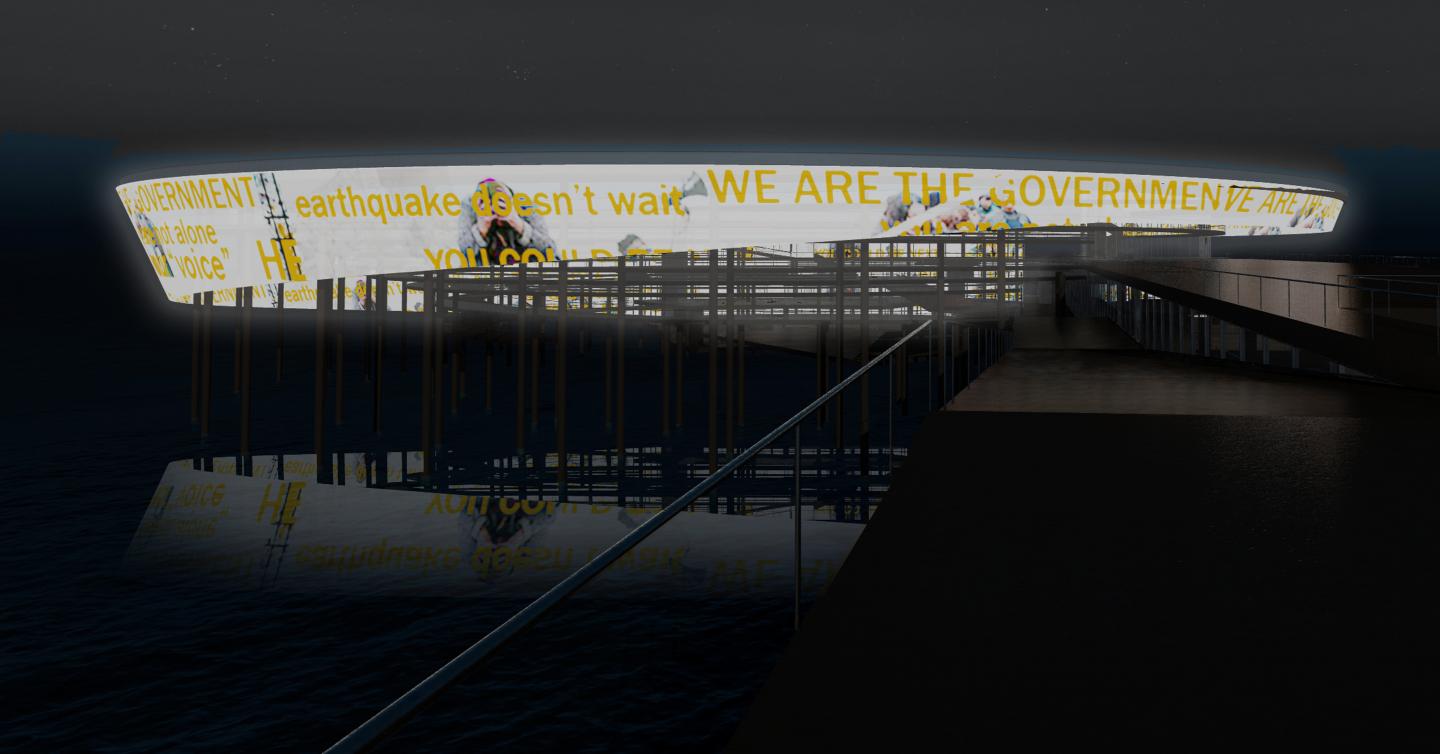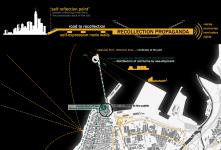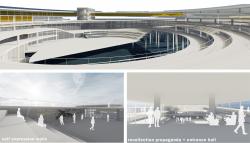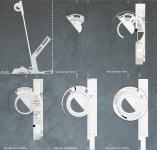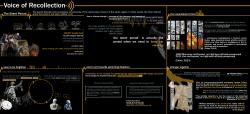The ongoing disasters happening in Turkey keep continuing to cause more damage both in tangible and intangible manners. All those people who has lost their lives or their close ones are tried to be kept silent. People who want to change things can't make their voices be heard to the bigger audience and governmental units. Each time a disaster happens, people try showing their grief but with nothing happening afterwards their hopes are and voices are heard less and less.
“The silent period” has started the main idea of the design response to the issue. The period between two consecutive occurrences of the same type of event in the same region, in other words, the time interval when the event is not observed, is called the silent period. In terms of the most common disaster in Turkey, this period is 1.5 years old with devastating earthquakes. Turkey has lost thousands of lives due to natural disasters and unfortunately continues to do so.
Considering these effects of disasters and climate changes all over the world, the frequency of the silent period is expected to increase. As stated by UNICEF, the main purpose in the pre-disaster period is to prepare the society against disasters and to ensure their resilience.
The quiet period is the period in which primary precautions against disaster are taken, that is, the intellectual and physical structure is created / strengthened, preparations and plans are made, and the society must be organized.
In other words, what we call the "silent period" is actually the period we need to make noise.
So why, after so many events that have happened to us as a society, do we still say "we learned our lesson this time" and yet the same things happen to us again, with greater destruction? While it is well known that we are a "disaster zone country", this precautionary and awareness deficiency we experience as a society is based on many factors, from the political and administrative neglect of the issue in history to the indifference of the public.
Fatih Turan, Kahramanmaraş disaster survivor, says that he filed a criminal complaint against both those who built the site where his family died and those who neglected their duties after the earthquake, and adds: "Even if the seas and mountains came together, I would definitely not forgive them, we do not. There is no way to describe what we are going through. I am deeply disappointed." As Bar Association President Doğan stated, after the Maraş earthquake, 70 construction crime complaints were written by lawyers a day. Almost all of the demolished buildings were buildings that benefited from the zoning peace. The public power that has insufficient inspections is as guilty as the contractors who steal the materials.
Earthquake investigations in Turkey's recent history have raised questions about whether public officials who are at fault or negligent in the inspection and permit processes of collapsed buildings will be punished, and it can only be predicted that the investigations will extend to public officials after contractors. The situation that supports this is that while high-level officials with public responsibility were not prosecuted in the 1999 Marmara earthquake, the situation did not change in the 7.2 magnitude Van earthquake that took place on October 23, 2011.
Well, after the Izmir earthquake, which was a later date than the Van earthquake, do not make improvements just because "if this place experiences the same fate as Izmir, it became an angel for me, my family or anyone else." Following the death of Şeyma, who said "Seek our rights", in the Maraş earthquake last February, are we seeking the rights of millions of people who died before or with her, as we requested? Are changes being made regarding these crimes? No, because natural disasters have now become a part of daily conversations. In natural disasters, concrete facts and solution approaches have been replaced by dramatic scenes and sometimes rebellious people. While people are enraptured in disaster dreams and scenarios, each disaster event is soon forgotten and another one follows immediately.
As İlber Ortaylı said, “There is a comfort among the Turkish nation in forgetting recent history. "After a week, things change, after 2 weeks, they change again. In the 3rd week, other kinds of fights and corruption break out." And the experiences are forgotten, and the voices of the disaster victims/bereaved people become weaker as they begin to sound singular.
So, what could be behind the fact that our society has been watching in place for all these years and spent the silent period really silent? It may be that previous experiences were negative, that he did not believe there was anything he could do, and that previous attempts were underestimated or his expectations were not met/had negative results.
However, while the Kahramanmaraş-centered earthquakes revealed Turkey's shortcomings in disaster management, the pressure on the media also increased. Among those who tried to speak out, penalties were imposed on various channels, and 138 people were detained on allegations of "provocative sharing". And unfortunately, this situation has now become a normal situation for our country.
Citizens also have a great role in creating public pressure on politicians and supervising the implementation of laws. This terrible disaster is not the result of the individual choices of those affected, nor is it a nightmare that they can overcome when left alone. How should we, as a people, stand shoulder to shoulder in the face of disaster, regardless of our political views. Without postponing what can be done today until tomorrow; We must do tomorrow's tasks without delay. Because either we will do it or we will cry a lot in the future.
The proposition of this design is a civil platform that will ensure this unity on this very issue. The concept of civil society, in its most general form, is a platform that will meet the justifications that it is "a society in which individuals or groups can determine their stance in areas where state control and pressure cannot reach or are not decisive, without obtaining permission from the state, without fear of prosecution, and by acting largely independently of the pressure of economic relations." will be.
In other words, civil society as a concept is a civilian influence that is outside state control and is essentially aimed at solving social problems. An initiative that aims to reveal social needs, even if it does not have a legal personality, will be an effective structure in the context of putting pressure on official authorities and bringing the emerging social disaster problem to the agenda. International human rights law offers an entry point into the issue of natural disasters, using legal means to hold governments accountable when they fail to prevent or reduce disaster risks.
When necessary, it will be able to carry the actions to the international rights community, interpreting the wishes of disaster victims and potential disaster victims, and working to ensure that their memories, voices and words are no longer forgotten, and Turkey's attitude towards natural disasters is now changed. Showing continuity to the public regarding their reactions on this issue and exercising their "actual rights" A platform where the environment will be provided.
A community that will remind those who ask "WHERE IS THE GOVERNMENT?" that "WE ARE THE GOVERNMENT" and will ensure that the voices of those who want to speak out are louder and more continuous.
So how will this community’s impact during a disaster be? First of all, I would like to start with the “alarm period”. The sector managements who receive the news will immediately gather the crisis desk, notify the relevant end units, inform them about the incident and alert them, and coordinate in a way that is ready for the foreign aid period and organize the plan put into practice.
The unit involved in this coordination task is currently AFAD, which was established in 2009. From the words of Kaptan, who took part in the Marmara earthquake in 1999 without AFAD, it is understood that many organizations, organizations and even international aid were able to start the recovery process in a short period of 2 hours. We see criticism that AFAD was not able to ensure coordination during the last exam in Kahramanmaraş and was not present at the site during the critical time period. The reason for this situation is that AFAD is politicized and not autonomous.
The difference between the 99 Marmara earthquake and the 23 Kahramanmaraş earthquake is that in 99, institutions took action "without waiting for any orders or directives".
As a result of these inferences, one of the activities of this society, which is proposed, which will function as "AN INSTITUTION IN WHICH IT IS THE COORDINATOR AND EVERYONE IS CONNECTED TO IT, WITHOUT WAITING FOR DIRECTIVES FROM ANYONE IN DISASTERS", in the "silent period" is to meet with institutions that will take action nationally or internationally in case of a disaster in Turkey, and to identify resources. By working on work/action planning, how to gather/take action/determine task distribution during/after the disaster, and action will be taken from one hand after the disaster, without the need for confusion or separate commands. And the fact that the union will be in direct communication with the public on this issue at all times will add a stronger aspect to this stage.
People's voices are not taken into consideration/suppressed in our country. The principles that form the design reveal themselves with a structure that cannot be overlooked or "cannot be silenced" in the gulf silhouette of Izmir, which is such an important city in Turkey and has recently suffered losses due to an earthquake. At the same time, it sets an example for the countries that share Turkey's situation, starting from Izmir.
2023
-
Designer: Deniz Can
Instructors: Assoc. Prof. Dr. Ülkü İnceköse, Assoc. Prof. Dr. Ebru Yılmaz
